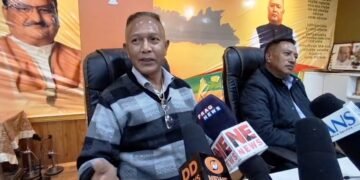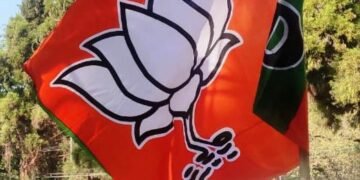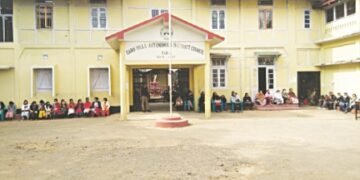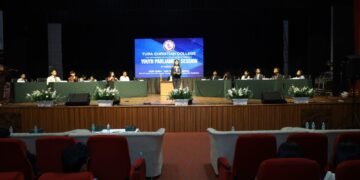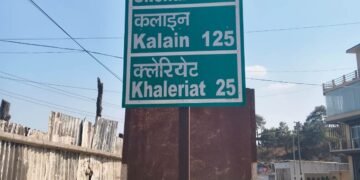The year 2023 ushered in new political equations, a shaky law and order situation, buried dreams and icons but no solution to unemployment and other pending problems of the state, even as people hung on to unfulfilled promises hoping they’ll come through in 2024.
The state Assembly elections held this year will go down in history as a watershed moment in which the political landscape changed with the near-complete routing of the old order, ie the Congress, even from the tenacious ground it held as the leading opposition party of the state. Congress, which had ruled the state for decades, could garner only five seats. But this was mainly because of the relentless infighting among party leaders spanning the whole 2018-23 term.
The Chief Minister Conrad K Sangma-led National People’s Party (NPP) garnered 26 seats. New political equations came up along with many fresh faces among the legislators and two totally new parties took up political space. One was the Trinamool Congress (TMC) from West Bengal, which piggy-backed into the political limelight on the debris of the Congress. The other was the Voice of the People Party (VPP), a brand new outfit that caught the imagination of the voters just before voting day in February. Its rallying song, ‘Ha U Prah’, was a ‘hill-board’ hit, if not a total hit at the hustings, which was largely captured by the United Democratic Party (UDP) in the Khasi Hills. But even the NPP could not get a majority in the House, having won only 26 seats, just short of a majority in the 60-seat Assembly.
This lack of majority initially created the familiar political suspense after elections. The regional parties, as usual, tried to make a show of unity, which Meghalayans are so used to. The UDP, egged on by its supporters, tried to combine with other regional parties, like the People’s Democratic Front (PDF) and Hill State People’s Democratic Party (HSPDP), along with the Congress and the TMC to make a play for forming the government. The drama was heightened by the antics of two fresh members of the oldest party of the state, the HSPDP, who dallied between getting behind the UDP or throwing themselves into the NPP camp. There was a bit of drama over three days when the HSPDP duo, after being part of some meetings, disappeared and surfaced in the NPP camp. Eventually Conrad was sworn in again as the CM in what can be called a xerox coalition of the earlier term’s combination, now upgraded to the Meghalaya Democratic Alliance 2.
The dramatics of elections and their aftermath played out in the headlines for a few more days and disappeared as they settled down and people lost interest. The BJP, which had pulled out all stops to woo the electorate, with Prime MInister Narendra Modi campaigning in the city along with several sorties by the Union Home Minister Amit Shah, drew a blank, except for their two long-time sitting MLAs who retained their seats as they are heavyweights on their own.
Unprecedented violence marked the aftermath of these elections. It had never happened before, according to local poll observers who flagged it and put it down to a mushrooming of parties with similar ideologies that have confused the electorate.
The polls resulted in several razor-thin wins/losses. Confusion about the winner in Shella led to violence and a curfew to control the public. Similar incidents took place in Mairang and Mookaiaw. Post-poll violence is a new factor, revealing a new pattern that will mark the trend of politics in the days to come.
The new coalition government led by Sangma had no time for a honeymoon as it straight off got propelled into acrimony in the first hour of the newly sworn-in Meghalaya Assembly. The House was instantly sent into a tizzy by the Governor addressing them in Hindi. It was not the first time this happened, but it disturbed the equilibrium of the four new VPP MLAs, who protested and walked out throwing a foreboding shadow of the things to come during the term ahead.
Also, for the first time this year, the House broke its purinitical traditions of ensuring that an untainted character holds the position of Speaker by giving the important post to Thomas A Sangma, against whom a rape charge FIR is pending attention in Shillong.
Within a few months ‘street politics’ drama hit normal life again, this time over the existing State Reservation Policy. A Meghalaya High Court ruling directed the government to create a roster system based on it. Amidst the cacophony of demands over the case, the VPP president, Ardent M Basaiawmoit, went on a hunger strike that lasted for 200 hours to demand that the Sangma government set up an expert committee to review a 51-year-old reservation policy. The expert committee was set up in August with the mandate to submit their report and recommendations within 12 months.
The reservation policy currently mandates reservation of 40 percent each for the Khasi-Jaintia and Garo tribals and 5 percent for other backward tribes, with the remaining 15 percent open. Five minority tribes have demanded a 15 percent job quota for Rabha, Koch, Boro, Hajong and Mann communities. Muslims have also petitioned for their own category.
There it remains so far, as a smouldering time bomb of an issue waiting to explode unless the MDA 2 government comes out with a formula that can satisfy all sides claiming a larger share of the dwindling jobs cake.
In a rare case of actual charge-sheets being served in the history of the state, 2023 saw the hard work of anti-corruption campaigners and RTI activists fructify into charge-sheets against a man who has become a sitting MLA, namely Sangjay A Sangma, who also happens to be the brother-in-law of the CM. The chargesheeted also includes 10 MDCs, officials and contractors in several cases of scams in the Garo Hills Autonomous District Council (GHADC), spanning more than four years in the Lokayukta. According to the RTI-based documents, more than Rs 100 crore has been misappropriated from the funds of the GHADC.
Illegal coke plans were demolished in an unprecedented action against illegal rat-hole mining, which is suspected to be feeding coal to these coke factories. Over the years, the Meghalaya High Court has passed many orders against illegal rat-hole mining that then led to its orders against coke plants. These are part of a total of 57 illegal coke plants set up in different parts of the Khasi-Jaintia Hills.
The action had legal grounds based on the hard work of (retd) Justice BP Katakey’s 12th interim report filed in the case of illegal mining and transportation of coal in Meghalaya, which indicated how coke plants operating illegally and without any permission have been shut down. Over the years there have been many orders that revealed that the coke plants thrived only because of the blatantly continuing illegal rat-hole coal mining despite the orders of the National Green Tribunal and the Supreme Court ban. It continued till the High Court had to take suo moto cognisance and take action. The state government has been at the receiving end of tongue lashing from the judiciary for failing to stop these illegalities and that it was only the goading of the court that any action was being taken. Some of the kingpins behind these illegal coke plants were also apprehended by the police.
The continued transportation of coal on the highways was another matter that kept cropping up throughout the year, with the Superintendent of Police of East Jaintia Hills being hurriedly transferred out of the coal mining region earlier this month as he had failed to make much headway in stopping the illegal transport of coal visible to all on the state highways. The High Court had even asked the Union Home Ministry to deploy the Central Industrial Security Force to check illegal coal transport, much to the embarrassment of the state authorities.
The Meghalaya-Assam boundary dispute inched closer to a resolution with border committees deciding to submit their reports by the end of this year. September, however, saw villagers from Assam and Meghalaya clash in Lapangap village along the boundary between Meghalaya’s West Jaintia Hills district and Assam’s West Karbi Anglong district. Both sides used bows and arrows. A few injuries were reported but the incident was brought under control with the authorities on both sides clamping down on the situation. The disputed areas in Block 1 are still being surveyed and the government spokespersons have announced that the work will continue on into early next year. Throughout the year the other political parties and NGOs have been demanding that 36 villages that are in the Block 1 area should be returned to Meghalaya and this will remain a flashpoint. In the meantime, the Mukroh case in which villagers were shot dead by the Assam police in 2022 remained without closure and will drag on into the new year even as the two states agreed to hand over the case to the CBI.
The Sangma-led MDA 2 coalition promised to make Meghalaya a $10 billion economy in the next five years. This awaits to be seen. But in its efforts to pursue this, the state enthusiastically jumped into holding precursor meetings of the G20 space economy leaders meeting (SLEM), which was held in Shillong. The security bandabost was unprecedented and this G20 meeting marked the first time that RFID identity surveillance was used to track the participants. A hurriedly spruced up capital welcomed delegates and hoardings festooned the city. The notorious Shillong traffic cooperated but the load-shedding continued throughout. Its outcome on the prospects of the state is awaited.
The iconic Mawmluh Cherra Cements Ltd (MCCL) has been non-functional for a long time but the demolition of its chimney brought the final curtain down on its 69-year history. The MCCL has been part of life in Sohra for decades and many livelihoods were dependent on it, thus leaving unemployment, sorrow and suffering in its wake. The state government’s plans to revive it failed even after spending Rs 300 crores in investment over the last 15 years, ministers claimed.
The Minister of Industries informed the public that there was no way out for the government but to close it down. How the workers will be rehabilitated is a matter that will be clarified in the new year, Sniawbhalang Dhar said. But a new angle has been added to the issue with the banned Hynniewtrep National Liberation Council (HNLC) offering “jobs” to those able-bodied MCCL employees who will now be sacked.
The HNLC, which had been in talks with the state government during the year, has decided not to participate in the next round until their pre-conditions for talks, which includes withdrawal of all cases filed against them, is implemented. This is also another task for the political leadership carried forward into the new year.
On April 14 what many feared happened as the heavily quarried Rngain Hill, one of the landmark mountains on the road to Pynursla, Dawki and other border villages, came crashing down, leading to the death of two occupants of a vehicle. Concerned activists and citizens had often complained about the rampant stone mining going on in the sensitive hill for alleged export to Bangladesh. FIRs had also been filed against the mining activities but there was no response from the government, despite it being the main route home to the constituency of Deputy Chief Minister Prestone Tynsong. So far no action has been taken on the unscrupulous quarriers.
Separately, two children lost their lives in a landslide in West Khasi hills, while mudslides ensured that the Sonapur tunnel on the Shillong-Silchar road remained blocked for several days during the monsoon. Heavy rains also damaged the PA Sangma Stadium in Tura, leading to accusations about the low quality of work by the contractors.
Big changes in education were also laid out this year. A four-member Education Commission was appointed by the Meghalaya government to recommend ways to revamp the education sector and suggest reforms and policy to boost education in the state.
The government also decided to constitute a permanent Meghalaya Education Recruitment Board (MERB) to ensure speedy and transparent process for recruitment of teachers. At the same time the state will adopt NCERT textbooks for schools under the Meghalaya Board of School Education.
It was shocking, however, that as many as one in every five schools in the state do not have toilet facilities for students, as revealed by the Annual Status of Education Report 2022. At the same time, the low enrollment rate of students in primary schools was flagged as a serious concern in October by the Minister of Education.
Many hopes and dreams lie pending and have been carried forward to 2024. For pressure groups, this includes the introduction of the Inner Line Permit. The state is also waiting on the Centre to include the Khasi and Garo languages in the Eighth Schedule of the Constitution. Shillong’s citizens specifically will wait and see whether any real progress is made on the Harijan Colony resettlement, the promise of a ropeway and whether the new Assembly building will really be ready next year.


